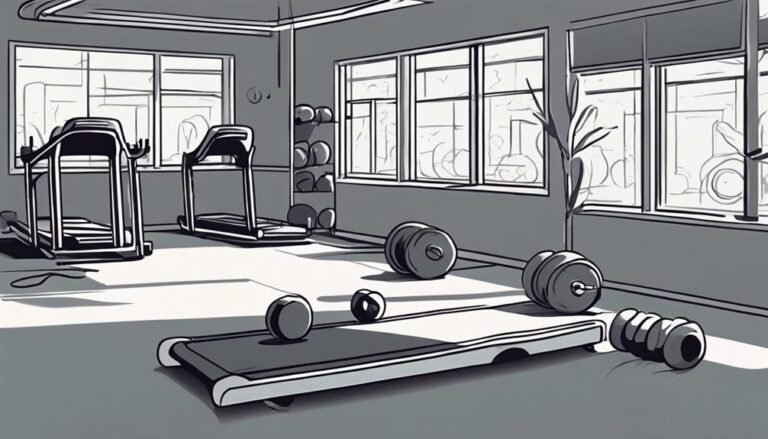What Hormones Affect Rest Quality for Men 40+?
As a man over 40, several hormones greatly impact your rest quality. Melatonin, which regulates your sleep-wake cycle, decreases with age, making it harder to fall asleep. Elevated cortisol levels from stress can disrupt your sleep patterns too. Low testosterone can lead to difficulties in achieving deep, restorative sleep, creating a detrimental cycle. Growth hormone also plays a role in your recovery and overall sleep quality. To optimize these hormones and improve your sleep, consider lifestyle changes like managing stress and exercising regularly. Keep exploring to discover more ways to enhance your rest and well-being.
Key Takeaways
- Testosterone: Declining levels can disrupt sleep patterns, leading to difficulties in achieving restorative sleep in men over 40.
- Cortisol: Elevated stress levels increase cortisol, which impairs the ability to relax and negatively impacts sleep quality.
- Melatonin: Production decreases with age and is affected by light exposure; lower levels can lead to sleep disturbances.
- Growth Hormone: Essential for recovery and muscle regeneration; lower levels correlate with less restorative sleep.
Importance of Sleep Quality
Sleep quality plays an essential role in your overall health and well-being, especially as you reach your 40s. A good night's sleep isn't just about feeling rested; it's vital for your physical and mental health.
Poor sleep can lead to weight gain, increased stress levels, and diminished cognitive function. You might notice that your energy levels dip or that you struggle to focus during the day.
By prioritizing sleep, you're setting the foundation for better mood regulation, enhanced productivity, and improved immune function.
Implementing a consistent sleep schedule, creating a relaxing bedtime routine, and optimizing your sleep environment can greatly boost your sleep quality.
Key Hormones Impacting Sleep

Understanding how key hormones affect your sleep can help you address any issues related to rest quality as you age.
Melatonin, often called the sleep hormone, regulates your sleep-wake cycle. As you get older, your body produces less melatonin, making it harder to fall asleep and stay asleep.
Cortisol, the stress hormone, can also disrupt your sleep patterns. Elevated cortisol levels, especially at night, can keep you awake and alert when you should be winding down.
Additionally, growth hormone plays a role in sleep quality; lower levels can lead to lighter, less restorative sleep.
Recognizing these hormonal shifts allows you to take steps to improve your sleep hygiene and overall rest quality.
Testosterone and Sleep Patterns
Testosterone's influence on your sleep patterns can greatly affect the quality of rest you experience as you age. As testosterone levels decline, many men report experiencing disrupted sleep and decreased overall sleep quality.
Lower testosterone can lead to difficulties in achieving deep, restorative sleep, which is essential for recovery and well-being. You might find yourself waking up more frequently during the night or struggling to fall asleep at all.
Additionally, the relationship between testosterone and sleep is bidirectional; poor sleep can further lower testosterone levels, creating a vicious cycle.
Addressing this imbalance through lifestyle changes, such as regular exercise and a healthy diet, may help improve your testosterone levels and, in turn, enhance your sleep quality.
Cortisol's Role in Rest

Cortisol, often referred to as the stress hormone, plays an essential role in regulating your body's rest and recovery processes.
When you're under stress, cortisol levels rise, which can disrupt your sleep patterns and hinder your ability to relax. Elevated cortisol can lead to increased wakefulness, making it harder to fall asleep or stay asleep through the night.
You might find that high-stress situations not only affect your mood but also your overall rest quality. To improve your sleep, managing stress levels is vital.
Techniques like mindfulness, regular exercise, and maintaining a consistent sleep schedule can help lower cortisol levels, allowing you to enjoy deeper, more restorative sleep.
Prioritizing these strategies can enhance your overall well-being and rest quality.
Growth Hormone and Recovery
Growth hormone plays an essential role in muscle recovery and regeneration, considerably impacting your overall rest quality as you age. As a man over 40, maintaining peak growth hormone levels can help you recover better after workouts, reduce fatigue, and improve sleep quality.
Here are some ways growth hormone aids your recovery:
- Muscle Repair: It stimulates the repair of damaged tissues.
- Fat Metabolism: It promotes fat breakdown, helping to maintain a healthy weight.
- Bone Density: It contributes to bone strength, reducing the risk of fractures.
- Energy Levels: It enhances energy availability, making you feel more refreshed.
Melatonin's Influence on Sleep

Melatonin plays an essential role in regulating your sleep cycles, helping you achieve deeper and more restorative rest. As you age, your body may produce less melatonin, which can lead to sleep disturbances. Understanding melatonin's influence can be significant for improving your sleep quality.
| Factor | Impact on Melatonin Production | Tips to Enhance Levels |
|---|---|---|
| Light Exposure | Reduces production | Limit screen time at night |
| Stress Levels | Inhibits secretion | Practice relaxation techniques |
| Diet | Affects synthesis | Include melatonin-rich foods |
| Sleep Environment | Influences quality | Create a dark, cool space |
Strategies for Hormonal Balance

Achieving hormonal balance is essential for maintaining restful sleep and overall well-being as you age. You can take several actionable steps to help regulate your hormones effectively:
- Regular Exercise: Engage in a mix of aerobic and strength training to boost testosterone and reduce stress hormones.
- Balanced Diet: Focus on whole foods, healthy fats, and adequate protein to support hormone production.
- Quality Sleep: Prioritize 7-9 hours of quality sleep each night to promote ideal hormonal function.
- Stress Management: Incorporate mindfulness techniques, like meditation and deep breathing, to lower cortisol levels.
Questions
How Does Age Affect Hormone Levels Related to Sleep?
As you age, hormone levels naturally decline, impacting your sleep. Melatonin decreases, making it harder to fall asleep. Additionally, cortisol levels can rise, leading to increased stress and disrupted sleep patterns.
Can Supplements Improve Hormone-Related Sleep Issues?
Yes, supplements can improve hormone-related sleep issues. You might find options like melatonin, magnesium, or herbal remedies beneficial. Always consult a healthcare professional before starting any supplement to guarantee it's right for you.
What Lifestyle Changes Impact Hormone Levels for Better Sleep?
To improve sleep, you should prioritize regular exercise, maintain a balanced diet, manage stress through mindfulness practices, and establish a consistent sleep schedule. These lifestyle changes can greatly enhance your hormone levels for better rest.
Are There Specific Foods That Enhance Sleep-Related Hormones?
You might be surprised to learn that certain foods, like cherries and nuts, can boost melatonin levels. Incorporating them into your diet might just enhance your sleep quality and help you feel more rested.
How Do Mental Health and Hormones Interact in Sleep Quality?
Mental health and hormones deeply influence your sleep quality. When you're stressed or anxious, cortisol levels rise, disrupting sleep. Conversely, balanced hormones promote relaxation, helping you achieve restorative rest and improve overall well-being.
Conclusion
So, while you might think that a late-night binge on your favorite show is the key to relaxation, the truth is that your hormones are calling the shots on your sleep quality.
Balancing testosterone, cortisol, growth hormone, and melatonin can make all the difference.
After all, who needs restful sleep when you can embrace the chaos of chronic fatigue?
But seriously, prioritizing hormonal health is your ticket to better rest and a more vibrant life.







